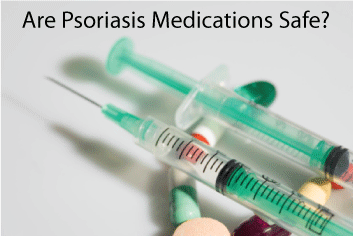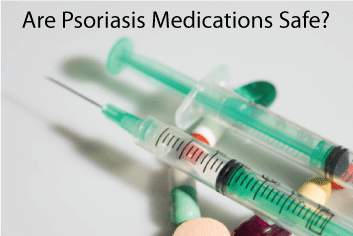
Psoriasis Medications Have Many Side Effects
If you have watched any TV, read any magazines or did a basic search for psoriasis on the web you have likely seen an advertisement for a psoriasis medication. There are so many that it seems like a new psoriasis medication is coming out each month. Because psoriasis can affect anyone, from anywhere, of any gender, race or age this disease is a global problem. But are psoriasis medications safe? In this article we are going to discuss several of the top prescription psoriasis medications and why or why not you should use them.

What are the top Psoriasis Medications?
When discussing psoriasis medications it is important to distinguish between brand names and the actual drug. Here is a list of some of the top psoriasis medications showing their brand name and their active drug.
Enbrel – Active Drug: Etanercept
Otezla – Active Drug: Apremilast
Humira – Active Drug: Adalimumab
Restasis – Active Drug: Cyclosporine
Cosentyx – Active Drug: Secukinumab
Stelara – Active Drug: Ustekinumab
You probably recognize all of these psoriasis medication brand names but have never heard of the active drug. Also, many of these psoriasis medications are similar but change the drug slightly or use a derivative so the drug company can patent their product. Notice in the list above that Humira, Cosentyx and Stelara all have active drugs that end in the three letters “mab”. This is because all three of these psoriasis medications use drugs that affect your immune system. The suffix “mab” refers to monoclonal antibody therapy which is a form of immunotherapy.
Who should use a Psoriasis Medications?
If you read the approved uses for any of these psoriasis medications you will see that they are all approved for use for moderate to severe psoriasis. Moderate psoriasis is typically defined as covering between 3 and 10 percent of the body. Sever psoriasis is for conditions that cover more than 10 percent of the body. However, just having psoriasis that covers more than 3 percent of your body does not necessarily mean you should choose to use a psoriasis medication. Taking a psoriasis medication needs serious consideration. Before even thinking about trying a prescribed psoriasis medication you need to first see if any of the over-the-counter drug products that are available will work for you. OTC drug products are made with active ingredients that have been proven and are recognized by the FDA as treatments for psoriasis. They are regulated and manufactured under guidelines written by the FDA. There are psoriasis creams, shampoos and even oils that can be very effective for the treatment of psoriasis. You can find many OTC psoriasis medications at your local pharmacy.
Why Psoriasis Medications Might Not Be Right for You
Making the choice to be treated with a prescribed psoriasis medication is a serious matter. Many of these drugs have severe side effects. Without listing the complete safety information for each of the psoriasis medications let’s take a look at some of the common side effects listed with these psoriasis medications:
Tuberculosis (TB) – Tuberculosis is an infectious disease, most commonly of the lungs, resulting in coughing, fever, chest pain, and weight loss. Many of these psoriasis medications leave your immune system more susceptible to getting TB.
Cancer – skin cancer and lymphoma are the most common listed potential side effects that may be associated with using a prescribed psoriasis medication.
Nervous System Problems – Numbness or tingling, problems with vision, dizziness or weakness in arms and legs.
Blood Problems – Decreased blood cells that help fight infections or stop bleeding
Liver Problems – Feeling very tired, skin or eyes that look yellow, poor appetite or vomiting, and pain on the right side of your stomach.
Common Side Effects for Specific Psoriasis Medications
COSENTIX: Cold symptoms, diarrhea, and upper respiratory infections.
HUMIRA: Injection site reactions include; redness, rash, swelling, itching or bruising. Other side effects include; upper respiratory infections (sinus infections), headaches, rash and nausea.
STELARA: Upper respiratory infections, headache and tiredness in psoriasis patients; joint pain and nausea in psoriatic arthritis patients; and upper respiratory infections, redness at the injection site, vaginal yeast infections, itching, urinary tract infections, and vomiting in Crohn’s disease patients.
OTEZLA: Diarrhea, nausea, upper respiratory tract infection, tension headache, and headache. Some patients taking this drug reported depression or mood changes.
So Are Psoriasis Medications Safe?
If you are suffering with psoriasis you are likely desperate to find something to help with this serious skin condition. Most people seek out a psoriasis medication not because they are suffering from physical pain or suffering from the disease but more from the embarrassment and the need for normal looking skin. Psoriasis medications are safe if they are taking correctly and monitored closely by your doctor. But even in the best circumstances there is always a chance you may become a statistic and come down with one of the serious side effects associated with psoriasis medications. Before you start and psoriasis medication do your research. Read about all of the side effects and the uses for the drug. Over-the-counter psoriasis medications are the best way to start. They are much less expensive then prescriptions and may provide you with the results you need without putting your body at serious risk. If you suffer with psoriasis on the body or scalp psoriasis ask your pharmacist what they recommend from the OTC products. Good quality topical creams and shampoos are available that can help.
Disclaimers: The information in this article is for education use only and is not medical advice. Before taking any medication consult with your doctor. The names Cosentix, Humira, Stelara and Otezla are registered trademarks that belong to the companies that registered them. For more information about these brand name psoriasis medications please contact them directly.






